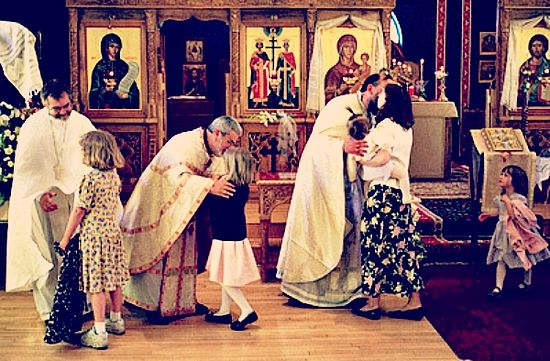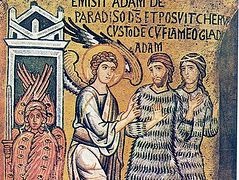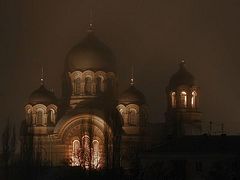Source: Alaska Dispatch News
March 18, 2016
Last Sunday I attended Forgiveness Sunday services at Holy Transfiguration Greek Orthodox Church and St. John Orthodox Cathedral, both churches in the Eastern Orthodox tradition. Each service was conducted with pastoral admonitions to members about the importance of asking forgiveness of each other for the sins and slights committed toward the other. Rev. Vasili Hillhouse of Holy Transfiguration said he needed his congregation’s forgiveness to continue in his role as their pastor. At St. John Orthodox, as the Rev. Marc Dunaway gave instructions for the forgiveness services, he said, “I know I need it.”
Both pastors shared insights about observing Lent in proper ways to stay focused on their spiritual journey to Pascha. The journey is aided by the Great Fast. Wesley Smith, in "First Things," writes “The Great Fast is one of those times when we must journey alone. Yes, it helps to know in times of weakness that we are simultaneously sharing the same struggle with three hundred million others. The arduous Lenten disciplines of the Great Fast help us, again in the words of (Archimandrite Vassilios) Papavassiliou, ‘turn back to Paradise to the Life of Eden’ so that ‘like Moses, we too may see God.’”
At the conclusion of special forgiveness liturgies, congregants positioned themselves, as at St. John Orthodox, in two circles, one inside another and facing each other. Then each person would ask forgiveness of the person facing them, and be forgiven by that person. In turn, the other person would ask for forgiveness, and the other would then forgive. There were many hugs, handshakes, tears and reconciliation during this process as the circles progressed in opposite directions so that everyone had an opportunity to ask for and receive forgiveness. I’ve never seen anything like it during my many years of visiting churches.
During the forgiveness liturgies themselves, there were several occasions where congregants bowed and prostrated themselves on the floor, especially at St. John Orthodox during The Prayer of St. Ephraim the Syrian. The prayer, in part, recited by all, says, “O Lord and Master of my life, take from me the spirit of sloth, faintheartedness, lust of power, and idle talk. But give rather the spirit of chastity, humility, patience, and love to Your servant. O Lord and King, grant me to see my own sins and not to judge my brother; for You are blessed unto ages of ages. Amen.”
It’s relatively common to hear pastors, during my church visits, say they need their congregation’s prayers. What’s uncommon is to hear pastors ask for their forgiveness. The words of an old Roger Miller song come to mind as I write this. “It's my belief pride is the chief cause in the decline in the number of husbands and wives.” Likewise, I think pride is the reason we hear so few calls from the clergy for forgiveness, and fear from congregants to ask for forgiveness personally. C.S. Lewis succinctly observed, “To be a Christian means to forgive the inexcusable because God has forgiven the inexcusable in you.”
Repentance and forgiveness are common themes in the Old Testament. As an example, Zechariah 1:3 says, “Therefore tell the people: This is what the Lord Almighty says: 'Return to me,' declares the Lord Almighty, 'and I will return to you,' says the Lord Almighty.” As I watched both of these services, this text kept running through my mind. I think I understand the great emphasis Orthodox Christians place on forgiveness, as they enter Great Lent. It is a meditation on the work of Christian salvation, and the one who brought the great gift of forgiveness and reconciliation. I appreciate the sincerity and friendliness of the Orthodox traditions I witnessed last Sunday and wish them Godspeed as they transit Great Lent.
In most Christian traditions outside of Orthodoxy, liturgical churches traditionally observed Lent with periods of fasting, meditation, soul searching, giving up things, church services, Lenten sermons, and looking forward to Good Friday, Holy Saturday, and Easter Sunday. For those churches, this coming week will be an important time as Holy Weeks starts with Palm Sunday tomorrow, ending with Easter celebrations a week hence.
Many evangelical Christian churches ignore Lent, for the most part, fast-forwarding toward Easter morning. That’s like skipping forward to the end of a good book to see how it all comes out in the end. Too often Christians see Easter as a great time for the kids with Easter egg hunts, beautiful outfits, thrilling sermons, music, and great dinners at home. In fact, the National Retail Federation forecasts Easter spending this year will total $17.3 billion, our fourth-largest spending holiday.
Other Christian traditions may not observe Easter at all, claiming it is idolatrous to observe it, or that it has pagan roots. Some say they observe it every worship day, but I’ve noticed many of their observances do not tend to bear out that statement.
In a Lenten homily at Calvary Episcopal Church, in Memphis, Tennessee in 2000, Barbara Brown Taylor, a writer, teacher, and biblical scholar, observed, “I actually know people who come to church on Good Friday and who don't come back on Easter. Easter is too pretty, they say. Easter is too cleaned-up. It is where they hope to live one day, in the land of milk and honey, but right now Good Friday is a better match for their souls, with its ruthless truth about the stench of death and the high price of love. It isn't that they don't care about what happens on Sunday. They do. They just don't believe that God is saving all the good news until then.”
The Lenten trek for Orthodox has just started, while the journey toward Easter is almost over for non-Orthodox believers. Whichever journey you’re taking, may God’s blessings be with you.
Chris Thompson is a religion scholar who visits local churches and writes about his experiences and matters of faith on his blog, churchvisits.com.




